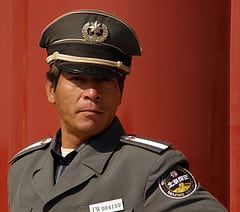I was curious why last year 1.2 million Chinese citizens took the public service entrance exam. Given the amount of work they put in to obtain one of only 20,000 available positions each year, it seemed to be a gamble with little payoff. On a sultry winter evening sitting at Peking University’s noodle canteen, my fourth year Chinese history buddy, Dan Ma, talked it over with me.
“Why do so many people apply to become public servants? Why don’t they work at a foreign company or a prominent state company?” I began.
“Foreign companies work graduates very hard here,” Dan replied, “A friend of mine works from 8:30 in the morning to midnight most days, and finishes even later the other times. The pay is good there, but they can only do it when young.”
“What about state companies?”
“The work hours are shorter, but the salary is lower too. The hierarchy is a slow climb. My cousin worked to become the chief accountant at the customs officer in five years. But it will take him another ten before he moves further – simply because of his age. Plus there is little chance to get out of China.”
I looked around at the students around us in the canteen sitting two by two opposite each other. The tables were covered with colourful advertisements of study abroad and career development programs. Black and white pictures of streetside noodle vendors on wooden carts to promote the history of noodles were hung sparing around the musty walls. The slurp of noodles was abrasive.
I couldn’t help but point out the obvious and asked, “But in civil service, the salary is lower, the bureaucracy is even stronger, and when will they travel overseas?”
“See, it’s still this concept of an ‘iron rice bowl’ that’s still prevalent among university graduates, or should I say their parents. This is the idea from the 50’s that you work in one workplace your entire life, and your entire life is taken care of in this job: housing, healthcare, food. The last remnant of such stability is in the public service. ”
“What about the salary?”
“It’s not about the money; in China power has always been more important. The route to wealth has always been through officialdom – business people have mostly been kept in the periphery in the past. Say you work as a public servant looking after small businesses. Every business that looks at expanding needs more land. But land is scarce, luckily your roommate from the university all those years ago is in the land and real estate department. You contact them and set up an opportunity for an expanding business to buy land. The business thanks you for the help and a friendship grows. You thank your friend and a relationship deepens.”
“So you have a lot of friends and a lot of gratitude on the job?” Sarcasm is something that does not transfer well from the Australian vernacular to Chinese, and this was one of those times I learned this.
“Exactly.”
We finished our meals and then walked outside. Standing under the floodlights opposite the fruit stand, we watched bikers zoom by, carried by the great gusts that run through Beijing from the northwest. Dry and brittle leaves twirled down around us, one falling on Dan’s head. It blew away before Dan’s hands reached up to brush it off of his head.
“And what about wealth?”
“As you move up the hierarchy, you will have a lot of friends who do different things in the business world, and a lot of friends in different departments of the government. What do you need wealth for?”
After we parted ways I was still uncertain why so many people wanted to walk down this path. Dan’s words were a little vague, but I didn’t want to push him on the point further. Maybe I should have, but like a lot of things in China – sometimes it’s better not to ask.


